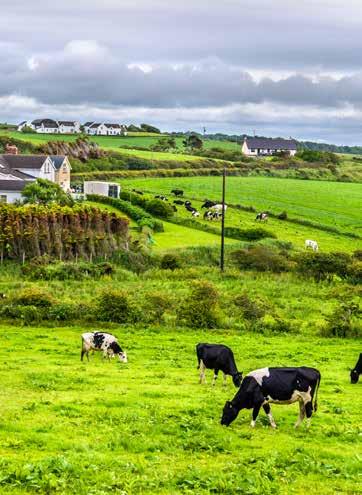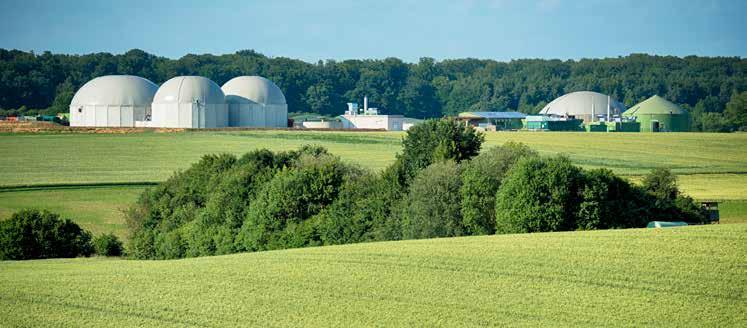










Our gas industry is working together to deliver a more sustainable future, developing renewable gas solutions that have the potential to deliver a positive impact for everyone in our region.
Imagine a future where we successfully decarbonise our energy system, helping Northern Ireland to achieve its net zero ambitions. Where homegrown green energy is driving economic growth and creating good jobs right across our region, boosting productivity and increasing the competitiveness of our major industries.
Where we no longer depend on fossil fuels and their related volatile markets subject to strained international relations. And where we are providing a solution for agricultural waste that helps improve our land and water resources, sustaining our rural communities.
That is the promise presented by renewable gas.
The potential of biomethane has been recognised by the Department for the Economy, the Department for Agriculture, Environment and Rural Affairs and, most recently, in the draft Programme for Government as an important opportunity to meet many of the NI Executive’s goals including those set out in the Energy Stategy.
Northern Ireland’s gas network operators –Mutual Energy, GNI (UK), Phoenix Energy, firmus energy and Evolve – are collectively charging forward with the delivery of regional energy decarbonisation.
We have a gas network capable of distributing renewable gas, both green hydrogen and biomethane. We have our own renewable gas fuel sources right on our doorstep. Furthermore, biomethane economies are already well established across Europe allowing NI to adopt best practice frameworks to advance our regional ambitions.
Anaerobic Digestion (all scales, modular and centralised) will contribute to the decoupling of agriculture output from the environmental constraint of greenhouse gas emissions and improve the overall position of our industry in regard to climate change. Subsequently, the Ulster Farmers’ Union have identified Biomethane production (and its various uses) as a means of additional income and a way to enhance integrated nutrient management in our farm businesses.
Ulster Farmers’ Union
1. Derived from organic matter like manure from farms, underutilised grass silage or food and other organic waste, biomethane is produced through a natural process called anaerobic digestion.
2. Anaerobic digesters create a controlled environment where bacteria, in the absence of oxygen, break down these organic materials. This process produces biogas which is a mixture of methane and carbon dioxide.
Biogas undergoes a standard purification process to remove elements such as carbon dioxide (“CO2”) before producing a carbon neutral gas virtually identical to natural gas known as biomethane.
This means it can be transported through existing gas pipelines and existing gas appliances can continue operating without any alteration, making the consumer transition smooth and efficient.
4. Biomethane is a versatile fuel that can provide resilient, affordable low carbon solutions to a wide range of energy sectors. Furthermore, the CO2 from anaerobic digestion can be relatively easily captured and used to produce high value e-fuel or even stored to deliver net negative emissions.

Biomethane as a renewable energy source represents a huge opportunity for Coca-Cola HBC to reduce greenhouse gas emissions, minimise our carbon footprint, and support a circular economy by turning waste into valuable energy.
Coca-Cola HBC
With the Northern Ireland Climate Change Act 2022 mandating net zero emissions by 2050, a major transformation of the energy system is crucial. Its requirement for the implementation of carbon budgets and a cut in emissions by 48% by 2030 (from just 26% by 2022) demands swift, affordable solutions that maximise emissions reductions.
Biomethane offers a key opportunity to drive this transition, potentially offering a decarbonised solution to 550,000 homes across Northern Ireland. Research by the Centre for Advanced
Sustainable Energy, shows biomethane has the potential to supply over 6,000 GWh per year — around 80% of current gas distribution network demand.
This level of production, through anaerobic digestion of manure and surplus silage, could cut Northern Ireland’s CO2 emissions by 845,000 tonnes per annum — 40% of 2022 industrial emissions.
Biomethane offers a strategic advantage to our key industries, giving companies obliged or seeking to decarbonise their production an option that allows them to achieve that aim in a timely manner. A reliable and resilient energy system, powered by biomethane, will sustain and empower the agrifood sector, whilst manufacturing businesses will also benefit
from enhanced competitiveness due to access to a cleaner, sustainable and readily available energy source. In essence, biomethane presents a win-win scenario for both the environment and the Northern Ireland economy.
Geopolitical tensions have starkly illuminated the vulnerability inherent in our reliance on imported fossil fuels. Developing indigenous production of biomethane would help unlock a more secure energy future for Northern Ireland, reducing
Northern Ireland’s rural economy stands to benefit significantly from the growth of biomethane in the region. Analysis by KPMGs shows that the injection of 1.5 TWh of biomethane into the NI gas network annually by 2030 would create 1,500 new green jobs, with most of these located in rural areas assisting in achieving the aim of greater regional balance in our economy. An estimated £500 million in capital investment
our exposure to price fluctuations of global markets and the potential for disruptions caused by international tensions.
The NI Executive’s first Environmental Improvement Plan highlights the need for a coordinated approach to address environmental challenges such as biodiversity loss, pollution, and climate change, emphasising the importance of sustainable development and climate resilience. The development of a biomethane economy would significantly contribute to achieving these goals by providing a renewable energy source that reduces greenhouse gas emissions and
could also be realised. Biomethane also offers farmers a potential revenue stream and will provide a much-needed boost to the rural economy through job creation and investment in infrastructure, helping our rural communities to thrive and allow future generations to continue to farm and preserve our countryside.
promotes a circular economy. By diverting organic waste from traditional waste management methods, an agriculture led biomethane industry can improve air quality, bolster biodiversity, and significantly reduce the region’s manurebased nutrient surplus, which is contributing to negative effects in our water courses.
Great Britain is already injecting significant volumes of domestically produced biomethane (6.8 TWh in 2023, projected to reach 8 TWh by 2030) and has implemented supportive policies like the Green Gas Support Scheme. The UK Government sees biomethane as a key factor in achieving net-zero cost effectively by 2050, with potential production reaching 30-40 TWh per annum.
The Republic of Ireland recently launched a National Biomethane Strategy with ambitious goals of 5.7 TWh of indigenous biomethane by 2030 and a €40 million Capital Grants support scheme. Ireland’s Renewable Heat Obligation, where suppliers of fossil fuels used for heat are incentivised to ensure a proportion of the energy they supply is renewable, will also be a key driver of biomethane.
Source: European Biogas Association
Northern Ireland has a rich track record of delivery in this space with biogas production used for renewable electricity generation for many years and biomethane recently injected into its gas network at the Granville Eco Park in Dungannon, but it is fast becoming clear that we need the policy, regulatory and support framework to match our ambitions.

To capitalise on the enormous potential of biomethane in Northern Ireland and capture all of the social, economic and environmental benefits it can bring, the timely establishment of a comprehensive and supportive policy framework is required which includes:
Setting an ambitious but achievable goal of 1.5 TWh of biomethane production per annum by 2030 will accelerate Northern Ireland’s transition to a greener future.
Establishing a capital support ‘Pathfinder’ scheme is crucial to kickstarting a biomethane economy in Northern Ireland. Additionally, a long-term support mechanism will provide the necessary investment certainty to sustain growth in the sector.
A supportive regulatory framework including strategic network investments and streamlined planning processes are fundamental to unlocking the full potential of biomethane.
